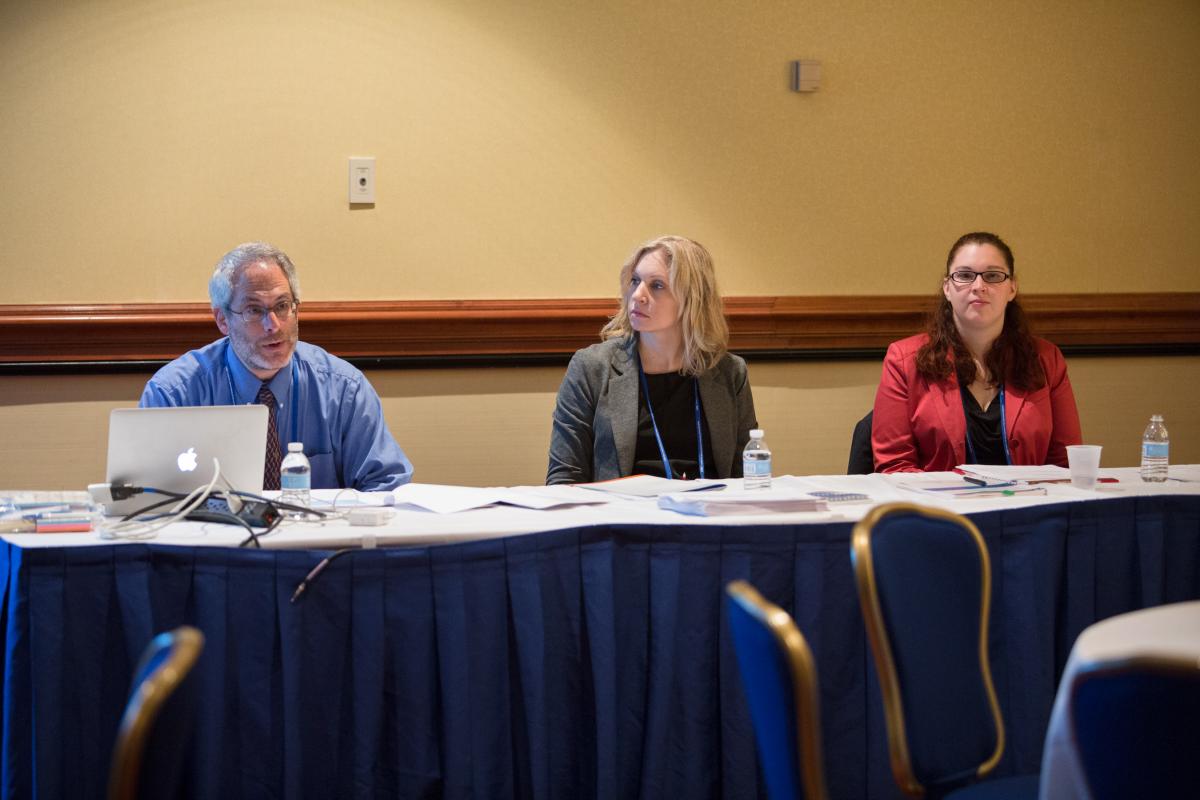Mining the Field: What are we Learning?
The Diving Deeper, Looking Forward session topics at the 2014 National Science Foundation Advancing Informal STEM Learning (AISL) Program Principal Investigator (PI) Meeting emerged from a pre-meeting survey of AISL-funded principal investigators; discussions with PIs and others who have participated in CAISE convenings over the past two years; and input from CAISE staff, co-PIs, and NSF Program Officers. These sessions were intended to catalyze discussions about cross-sector topics and issues that can continue beyond the meeting and generate new ideas for future projects and collaborations. The following blog post is a summary of questions, issues and ideas expressed by the participants in this session.

From left: Gary Silverstein (Westat); Amy Grack Nelson (SMM); Grace Troxel (CAISE)
Over the past several years, there have been multiple efforts to collect data from informal science education (ISE) professionals about the field. The “Mining the Field: What are we Learning” session at the 2014 AISL PI Meeting explored three of these efforts, providing an overview of what each project has learned from its data collection, what we still don’t know, and providing an update on the status of each project.
The Online Project Monitoring System
Gary Silverstein from Westat presented findings from the Online Project Monitoring System (OPMS), which collects data on informal STEM learning project characteristics, activities, and outcomes. The OPMS consists of three surveys developed specifically for the AISL program: baseline, closeout, and annual. The NSF is able that data to analyze trends over time. Some of the major questions explored during the session included:
- What types of institutions are participating in the AISL program?
- What types of public audiences are AISL projects targeting?
- How are projects expecting to reach public audiences?
- What methods are projects using to examine their impact on the public?
For more background on the OPMS, check out the introduction to the AISL Program's Online Project Monitoring System page on InformalScience.org.
Building Informal Science Education (BISE)
Amy Grack Nelson from the Science Museum of Minnesota represented the Building Informal Science Education (BISE) project, which coded and synthesized over 500 evaluation reports posted to InformalScience.org in order to explore what the evaluation and informal science learning communities can learn from them. Project team members are based at the University of Pittsburgh and the Science Museum of Minnesota. Resources from the BISE Project can be used to understand how evaluations are carried out for various types of ISE projects; to inform the development of an evaluation; and to learn from similar types of projects, including from their recommendations, improvements, and impacts. The data can be used to identify key components of evaluation reports and to establish best practices for evaluation in ISE.
More information about BISE’s coding framework and findings can be found in their series of Perspectives blog posts and the summary a recent session on online infrastructure for ISE professionals at the 2014 ASTC conference. BISE is currently exploring ways to share the database and widely disseminate findings.
The ISE Evidence Wiki
The third part of the session focused on the ISE Evidence Wiki, which is located in the Research section of InformalScience.org. The ISE Evidence Wiki is a crowdsourced resource that provides short statements of evidence about informal STEM education written by learning researchers, evaluators and practitioners. The Wiki provides a venue to share a project’s findings, learn from the field’s growing knowledge base, and to find citations and evidence related to ISE topics and ways of working.
For instructions on how you can contribute to the ISE Evidence Wiki, please visit the newly revised Community Portal or contact CAISE's Digital Librarian Grace Troxel at gtroxel@astc.org.
Related Resources
The following resources were shared during the presentation:
Selected Resources from the Informal Commons
- ASTC-AAM 2011 Workforce Report
- ISE Professionals Knowledge and Attitudes Regarding Science Identity for Learners in Informal Environments: Results of a National Survey
- The Informal Science Education Landscape: A Preliminary Investigation
Special thanks to Ashley Simpkins for documenting this session.